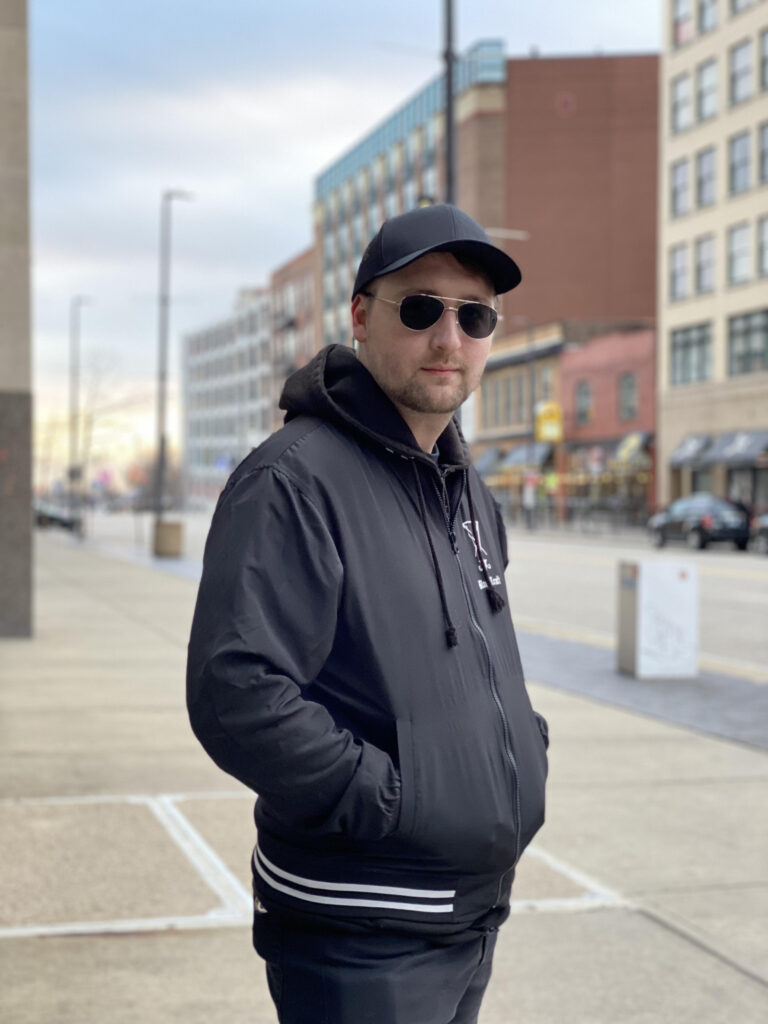
April is National Poetry Month, and The Daily is putting the spotlight on members of the university community who are passionate about expressing themselves through poetry.
Today we’re featuring Ian Anderson, a coordinator in Case Western Reserve’s Office of Advancement Services. Anderson, who’s originally from Cleveland, has worked at the university since 2021, training employees how to use advancement programs and helping with development requests.
Anderson hopes that poetry will help him leave a legacy.
“I hope that someday I’m known for what I write and I hope that it will inspire others to create works of poetry,” he explained. “Without poetry, I don’t know where I would have ended up. I cannot even begin to explain its importance in my life for my mental health.”
1. Can you share one of the poems you’ve written and talk a bit about it—what inspired it?
“I See Nothing but Eternity”
We were both born in the same, ethereal motion.
Endlessly searching for the banks of a distant ocean.
You are the peace of mind that for years, I’ve yearned for.
You are the gentle waves that caress my endless shore.
Sing to me, my love, your swansong song against the skyline.
Embrace me, my dear, so that our stars begin to align.
The sand beneath our feet, and the wind in our hair,
As if you were the answer to my continuous prayer.
If in some beautiful way, you’ve brought what the stars foretold,
Then no one can ever take the spot in my heart that you hold.
And in this life, or in the next, I’ll have you lay forever with me.
When I look at the soul you possess, I see nothing but eternity.
A lot of the poems I wrote during 2020, when the pandemic began, were inspired by love or depression—two things not always mutually exclusive. I was inspired to write this one after hearing my grandmother talk about my grandfather. I tried my best to take the love she felt for him and put it into words.
To see people in love was very inspiring to me, and to put it into words based on their experiences makes it even more inspiring. Even when my grandfather passed, my grandmother never stopped loving him.
2. Where do you draw inspiration in general?
I draw most of my inspiration from the experiences I’ve had dealing with emotions, whether they be good or bad. Sometimes lines just pop up into my head without warning. And sometimes, I just can’t explain how these ideas come up.
I once wrote a poem about my grandfather’s journey to America (“Across the Western Ocean”), a poem from the perspective of a dying forest (“The Last Sigh of the Wind”), and the idea of ghosts dancing on a beach (“I Watched You Dancing in the Sunset”). All of these poems can be found on my blog, The Corsair.
3. Who are some of your favorite poets and why?
Some of my inspirations may be a shock because my favorite writers or poets can’t be easily seen in my work. That being said:
- Shane MacGowan, the singer for the Celtic band The Pogues: I love how his works tell a story and touch on real subjects. Although he’s a lyricist, no one can write something quite like him.
- Robert Burns: Scotland’s national poet. My grandparents are immigrants from Scotland, and I remember having my family read his works to me when I was very little.
- Alexander Pushkin: The emotion put in Pushkin’s poems has always resonated with me as well. I think his works should be studied more in America.
- Edgar Allan Poe: There’s not much explaining to this one—horror has always been a major influence on my life and it all started with him.
4. When did you first get started doing poetry?
My third grade teacher, Barb Dennis, gave me the inspiration to start writing poems and short stories. I wrote poems in my notebooks all day long during school and really got into it heavily in 2017. I had a leg injury that limited my mobility, so I figured I could pass the time by writing.
5. Why do you love poetry? Why should others?
I cannot imagine going through life without the ability to channel my emotions and thoughts in such a way. It’s therapy, it’s art, it’s expression—it is essential to my existence and my well-being.
I love poetry because it is a part of me that is created out of my own interpretation of the world. I think others should be engaged with poetry because it will give them an experience that is uniquely human, and unique to their own interpretation.
